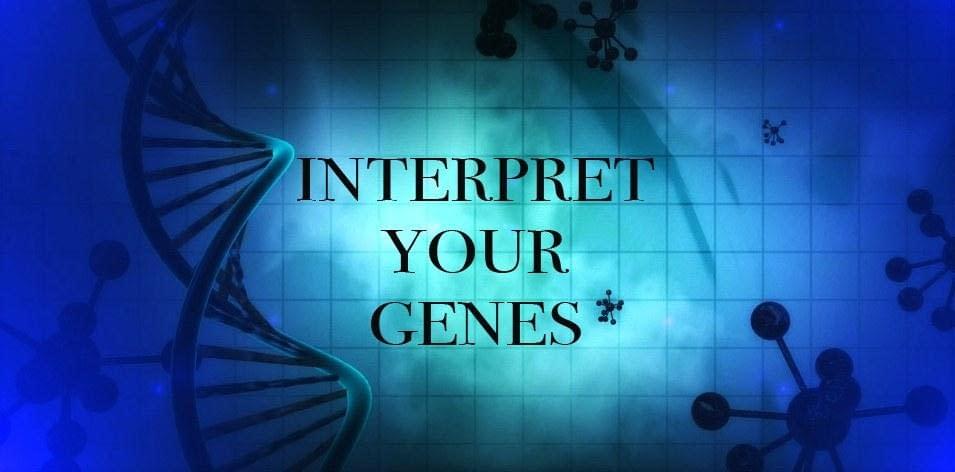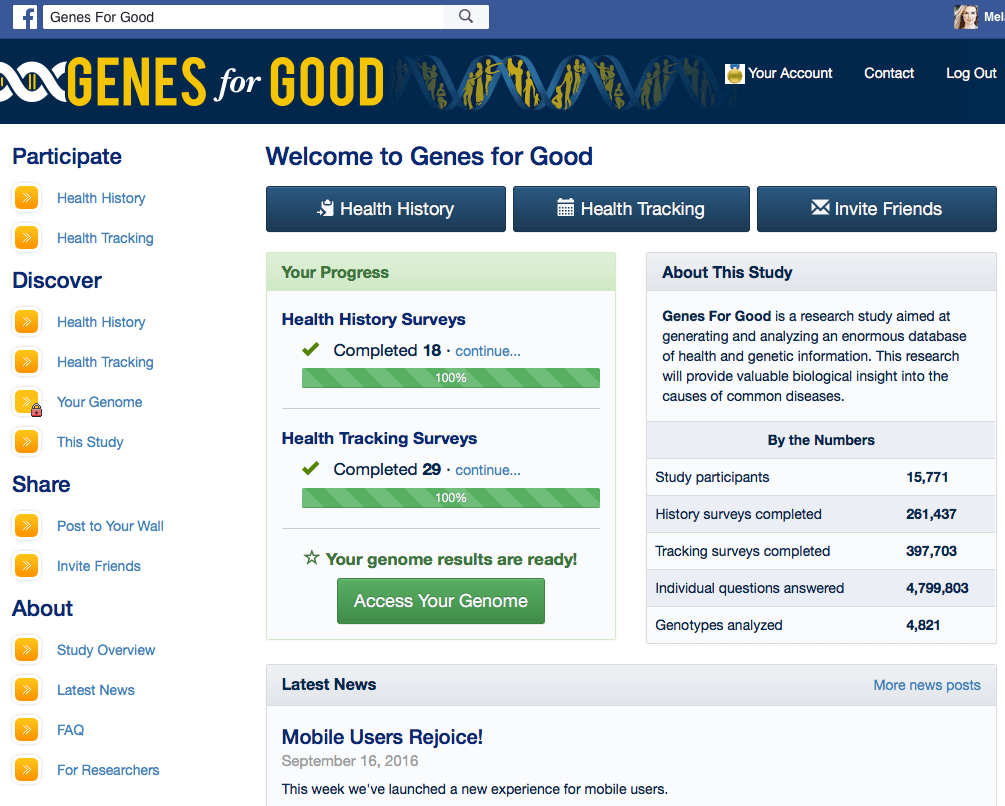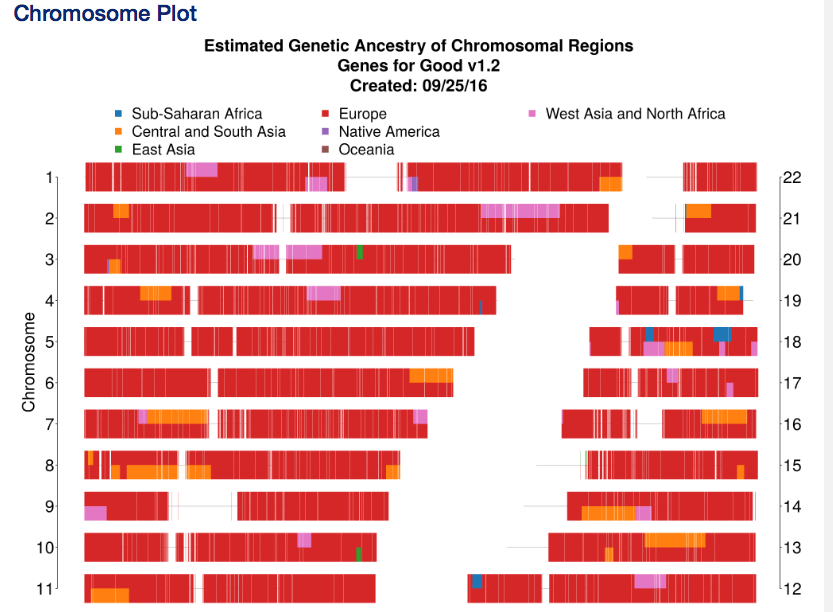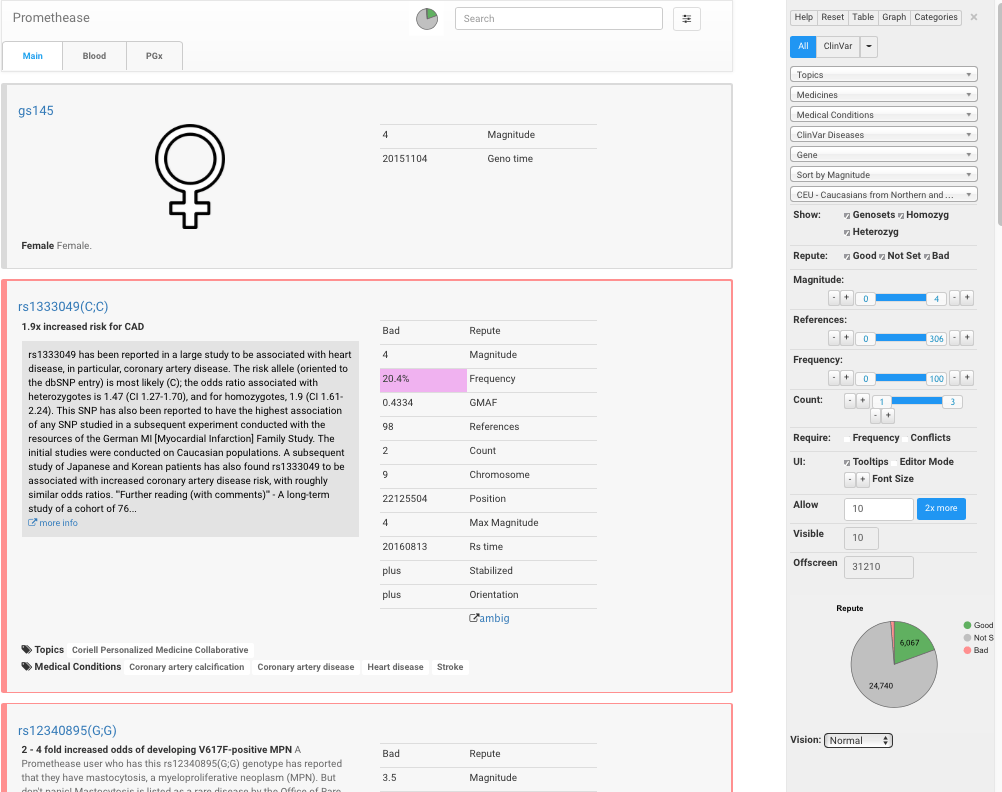Want to unlock the secrets to your genetic programming? In this post I'll show you how to get your raw genetic data for free with Genes For Good, and how to interpret it online with Genetic Genie and Prometheus. Discover your tendencies towards certain traits, reactions to medications and environmental toxins, states of disease, and much more!

GENES: AN OVERVIEW
While you may remember the basic gist of DNA and genes from high school biology, here's a brief refresher. The cells throughout your body contain your DNA, or deoxyribonucleic acid. DNA is akin to your body's super complex instruction manual, which informs your body how to produce the needed proteins necessary to build your body and generate your life. The stereotypical double helix, DNA features two parallel twisting sides made of sugar and phosphate molecules, connected by rungs featuring pairs of individual nucleotides: Adenine (A), Thymine (T), Guanine (G), and Cytosine (C). A always goes with T, and C always goes with G. The order of these individual strands is basically a code for your genetic programming.
About 3% of DNA is in the form of individual genes (20,000 to 25,000 of 'em!). These genes are specific sequences that code individual proteins. So, for example, one section of your DNA may be the gene for coding your hair texture, while another determines your eye color.
DNA molecules, containing the genes, are wrapped around proteins to form individual packets called chromosomes - 23 pairs to be exact! These 23 chromosomes are in the nucleus of each cell. Basically, the entire genetic code for your entire self is stored everywhere throughout your self. Pretty cool!
99.9% of everyone's genes (the ordering of the A, T, C, and G letters) are exactly the same! It's the differences in the .1%, known as the genetic variants, which determine a person's individual traits, and which may predispose them towards certain tendencies, as well as states of heath and disease. The overall picture of this genetic identity is referred to as a genotype.
SNPs (AND DISEASE)
Whenever your cells replicate, they copy the DNA for new cells. Given the vast amount of all the nucleotides (A, C, T and G letters) to copy, it's not surprisingly that cells occasionally make copy errors, plugging in the wrong letter. These errors are known as SNPs, or single nucleotide polymorphisms. SNPs have the potential to up or down regulate gene function, and potentially change the type of protein coded for by the gene. Since we have two copies of most of our genes - one from mom and one from dad - either copy can potentially contain a SNP mutation. If only one copy is mutated, the SNP is heterogeneous, while if both copies are mutated, the SNP is homogenous.
Thankfully, most SNPs aren't a big deal. In fact, an estimated 1 out of 300 nucleotides features a SNP, meaning the average human may have around 10 million SNPs! Some SNPs, however, can affect the function of genes. It can make them defective, and function at less than optimal levels. On the contrary, it could make them unregulated, and over perform. (In any case, it does not tend to make the gene completely defunct.) Some SNPs can influence a person's propensity towards certain disease states, reactions to food and environmental toxins, or drug interactions. We are actually born with most of our SNPs, which are passed on hereditarily, explaining why certain diseases can be "hereditary." While SNPs do not doom you to ill health, they may highlight risk factors and illuminate areas in which you need to exercise particular caution in your lifestyle.
GETTING YOUR RAW GENETIC DATA
Unless you happen to have DNA analyzing equipment chilling in your basement (if so, can we be friends?), you're going to need a service to generate your raw genetic data. Thankfully, since the entirety of your genetic data is found all through the cells of your body, just a smidge of saliva can reveal your genetic workings!
23andMe ($99-$199)
I haven't personally used 23andMe, as I found the free alternative discussed in a bit. However, for $99- $199, you can purchase a spit kit and receive your raw genetic data. 23andMe used to automatically generate health reports based on the data, but the FDA since shut that down. After a brief hiatus, 23andMe gained FDA approval for modified health reports which simply indicate whether you are a carrier for a select number of "approved" disease risk genes. In any case, I'll be showing you how to hardcore analyze your raw genetic data through other online services.
GENES FOR GOOD (FREE)

For those with patience but not money (or who simply don't want to shell out $199 for 23andMe), here's the solution! It's called Genes for Good. It's not just free, it's super free, in a they-even-pay-for-postage type way.
Genes For Good is a research project run by the University of Michigan, which aims to discover disease cures by analyzing the genetic data, lifestyle, and health of thousands of participants. As of October 2016, the study has over 15,000 participants, with over 4,000 genotypes analyzed. (Note: I do wonder how long the project will continue, since the study states they would continue through 5,000 spit tests.)
1. Sign Up
To enroll in Genes For Good, visit their Facebook app. Once you create an account as a "Regular" member, you can begin the steps to receive the genetic spit kit. You have to complete 15 Health History surveys and 20 Health Tracking surveys.
2. Surveys
Most of the Health History surveys are simple questionnaires concerning your personal and familial health history (like tobacco use or Type 2 Diabetes) as well as mental tendencies (like your preference for smaller instant gratification or larger big term rewards - Would you rather have $25 today, or $60 in 14 days?) You can knock out all the health history surveys at once in an hour or so if you like. (Unless you make the mistake I did of taking the "Patterns" study, with 30 pictures featuring a missing piece. Though it claimed it would only take 20 minutes, I resolved to solve every single one, and found myself intensely staring at the computer screen for hours. Oops. )
The daily Health Tracking surveys are quick and easy. For example, "Alcohol Use" asks how much and what you drank the prior night, and "Weight" simply asks your weight, and if you got on a scale to check. The only catch is you have to do these over the course of a few days (two or more times, in a span of 8 or more days.)
Once you complete the minimum amount of surveys, you transition from a "Regular" member to a "Silver" member. Congratulations! You're now eligible for a spit kit! At this point, you fill out a variety of wavers indicating your volunteer status and acknowledging the implications of the program, such as the presence of genetic information in your saliva (which hopefully you're aware of by this point.)
Some key takeaways to what you're signing: your DNA will be "frozen and stored indefinitely in a secure laboratory," your DNA data may be released in an un-identified form to qualified researchers who will not attempt to pursue identification, any personal information will be approved by institutional review boards, and the Genes For Good researchers hold a "Certificate of Confidentiality" from the National Institutes of Health to protect participants. The only information available to Facebook is your App use, but not the information collected.
3. The Spit Test
Within 2 weeks, you should receive your spit test in the mail. The kit includes a physical copy of the study information and consent form, the spit kit collection system, and an addressed return bubble envelope, complete with postage. (Being the obsessive control freak worrier I am, I added my own extra postage just in case.)
Collecting your spit is a super fun experience reminiscent of Dexter's Laboratory. The directions state to "rub your cheeks and wiggle your tongue to stimulate the secretion of saliva," which you then spit into the collection tube. Though I chuckled when I read the process "may take 7 minutes, and should not exceed 30 minutes," it probably did take a good 10 minutes for me to hack up 2 ml of clear (not bubble!) spit. Who knew? When you've proudly completed your swishing and spitting, you add the liquid preservative, seal it, shake it for 10 seconds, and then place your proudly completed collection tube into the provided plastic bag with absorbent cloth material. This goes hand in hand with your consent forms into the bubble envelope, which feature fun government-looking stickers, so you can feel like a super secret agent as you drop your precious specimen in the mail.
Once the saliva harboring the key to your genetic destiny is safely in the hands of the trusted stewards known as USPS, you can sit back and wait another 2 weeks or so for your specimen to be received by the University. When this happens, you will receive a FB notification of its receipt, and later confirmation of its eligibility. (If something goes wrong with the sample, Genes For Good will send you another kit.) At this point, the real waiting game begins, as you sit back and wait 2-3 months for the lab to churn out your results.
THE TIMELINE: I became eligible for the Spit Test in mid July 2016. The spit kit was shipped on July 29th, 2016. I received the kit, mailed it back, and received confirmation of receipt on August 12th, 2016. I finally received my genetic data on September 27th, 2016. So all in all, the process took about 2.5 months to complete.
5. Receive Your Genetic Data!

Finally, the golden day arrives! You receive a congratulatory FB notification that your genetic data is ready! Such glory! For the initial findings, Genes For Good provides a Pie Chart of your ancestry, an Ancestry Principle Component Analysis (PCA) chart showing how similar you are to genetically-like individuals, and a Chromosome Plot illustrating the likely geographical ancestry for each segment of your 22 chromosome pairs. (My takeaway is I'm overwhelmingly European.)
But of course, the real gem is downloading your raw genetic data, which is where things get real. Before handing over the goods, Genes For Good has you watch a presentation on your raw genetic data content and risks. This includes an overview of DNA and genotypes, an explanation of the genetic data files, admittance of potential errors, and warnings about the implications of interpreting genetic data, such as drawing erroneous conclusions or finding out sensitive and surprising information (i.e.: you're adopted!), as well as security risks (i.e.: downloading your data from the secure server makes it more vulnerable to hackers). The data itself is accessed through time sensitive passwords and links provided via email.
When you download the goodies (mine was a whopping 991.8 MB), you get 9 files. These include versions of your exact raw data for your genotype, featuring around 500,000 positions of your DNA, as well as files of your imputed genotype, which feature the ~500,000 exact measurements, as well as an additional ~7 million "guesses" of your DNA, based on 2,500 people's complete pre-determined genotypes. These files are presented in various formats, including .txt ones you can read, (basically a loooonnnnnnnggggg list of numbers and letters), a less-readable Variant Call Format (VCF) (still not sure what I'm suppose to do with that one), as well as one in 23andMe format, which is great for uploading to genetic interpreters, which we shall get to in a moment!
Out of curiosity, I attempted to print the .txt file. After a good 5 minutes of "thinking," the print preview popped up to say it would be 15,385 pages. Oh my.
INTERPRETING YOUR GENETIC DATA
So you did it. Either you shelled out $200 for 23andMe, or you went the free research route of Genes for Good. Either way, you now happily hold in your possession a near-unreadable massive file of jumbled letters signifying your genetic destiny. While you could look up various SNPs lists and filter through your data like you're on the search for Carmen Sandiego, I recommend just... not doing that. Instead, you can run your data through some online interpreters! Such as...
GENETIC GENIE
Genetic Genie is a free, online service which analyzes your raw genetic data and generates an easily readable, short methylation and/or detox analysis PDF.
Methylation Profile (MTHFR, MAO, COMT, etc.)
Genetic Genie's Methylation Profile looks at various potential mutations influencing your body's ability to properly methylate - the process in which a methyl group (made of one carbon and 3 hydrogen atoms) is added to a molecule. Methylation is an important factor in energy generation, detoxification, and a myriad of other processes in the body.
For example, the MTHFR, MTR, and MTRR mutations influence the body's ability to properly process and utilize B12 and folate, as well as convert inflammatory homocysteine into methionine. Rather than go into all the nitty-gritty details, I shall refer you to my post, MTHFR Mutations: Do you have this hidden kryptonite?, for all the details. But the key takeaway is that proper methylation of B vitamins is key for health in the body, and support for related mutations involves taking methylated B vitamins, and avoiding folic acid at all costs, since it cannot be adequately processed and thus becomes toxic! (This includes avoiding foods "fortified" with B vitamins.)
Or consider the COMT gene, involved with breaking down neurotransmitters like dopamine, epinephrine, and norepinephrine, as well as estrogen. Those with COMT SNPs may struggle with breaking down these stimulating neurotransmitters, leading to overstimulation and symptoms like irritability, hyperactivity, anxiety, and insomnia. This is known as a "Warrior" vs. "Worrier" mutation. Those with properly functioning COMT genes are like "Warriors" who only become "intense" in necessary, stressful situations. On the other hand, those with the malfunctioning COMT gene are "Worriers": always intensely focused and likely intellectually successfully, but easily subject to overstimulation, anxiety, insomnia, and stress meltdowns. (I've got two COMT SNPs - No surprise there.)
MAO-A is another enzyme involved with deconstructing neurotransmitters, like serotonin, norepinephrine, and dopamine. Problems with this gene can encourage mood swings, OCD, and aggressive behavior.
Detox Profile (CYP, NAT1, etc.)
Genetic Genie's Detox Profile report looks at (surprise!) genes involved with detoxification. For example, the CYP genes are involved with the creation and breakdown of hormones, fatty acids, and bile, as well as processing things like medications and toxins. (The CYP1B1 mutation which I have is involved with processing estrogen.) Or consider the NAT1 and NAT2 genes, which refer to the N-acetyltransferases enzymes responsible for detoxifying things like caffeine and drugs in the liver, as well as deactivating environmental chemicals like cigarette smoke. These genes can help determine whether you are a fast or slow metabolizer of drugs and medications.
PROMETHEUS
For the complete lowdown on your genetic data, look no further than Prometheus. For $5-10, you can upload your 23andMe file (or the Genes For Good data provided in 23andMe format), and receive access to a highly organized, super addictive portal letting you easily search through the entirety of your SNPs to see what's going on. (The information remains online for 45 days.)
When uploading your genetic date from Genes For Good to Prometheus, you have 3 options. You can upload either your smaller, exact raw data for your specific genotype, or the larger imputed raw data, which will include inferred genes. Alternatively, you can upload both for an additional $2 (this is what I did). With this situation, any gene which appears in both files (and thus is certain for you), will display a "count: 2."

Prometheus catalogues your data and pulls relevant information from SNPedia, a Wikipedia-esque site providing insight on a whopping 50,000+ thousand SNPS. The results are listed by the RS number indicating the particular location of the SNP on that gene. (The name of the gene is listed as well.) Prometheus color-codes the results, which you can filter by "Good," "Bad," and "Not Set" Repute. These indicate whether the gene is linked to health, disease, or still to be determined/not applicable (i.e.: related to your ancestry or hair color.) Before you freak out by the potentially high number of "BAD" SNPs, remember that the average person has hundreds of SNPs, these genes indicate correlation not causation, and environmental factors are highly influential. My personal Prometheus report generated 6,067 "GOOD" SNPs, 413 "BAD" SNPs, and 24, 740 "NOT SET" SNPs.
Prometheus also features popular topics to filter your results, such as medicines and diseases. Results can be further filtered by "ClinVar," showing results deemed clinically relevant by the NIH. Of course there's also a search bar for you to investigate whatever suits your fancy.
By default, Prometheus shows 10 results at a time, since, as the site notes, "It is generally not possible to show all genos at one time, as your browser can't handle it and you're unlikely to read them all.” That made me chuckle.
GENES TO EXPLORE
Once you've spent the time and/or money to get your genetic data, have succesfully uploaded it to Prometheus, and fumbled around a bit until you sort of understand the information it's spewing at you... that's when the real fun begins! While there are literally thousands of genes to explore, here are examples of a few nifty ones to check!
The Cilantro Gene
Variants of the OR10A2 gene may determine whether you think cilantro tastes good... or like soap. This is likely because the gene affects a particular taste bud which detects the soapy-flavored compound in cilantro. (I think Cilantro is so yummy!)
The Fat Gene
Variants of the FTO "Fat" gene may influence calorie intake, weight gain, and predispositions towards obesity, as well as Type 2 Diabetes (as related to obesity.)
High Protein or Low Protein Diet Gene
Variants of the TCF7L2 gene may influence whether you do better on a high protein or low protein diet (and whether you are more like to gain or lose weight accordingly!) It didn't surprise me that my C variant at rs7903146 and A variant at rs10885406 indicate a high protein diet for the win. Yey steak and chicken!
Omega 3 Processing Gene
Variants in the FADS1 gene may influence your body's ability to convert plant-based Omega 3s into forms useable by the body. If you have a C allele at rs174550, you definitely want to favor fatty fish rather than plant-based Omega 3s like flaxseed oil. (This may explain in part why some people thrive on vegetarian diets and others... not so much.)
The Speed Gene
The ACTN3 gene is responsible for engineering a certain type of muscle protein important for fast twitch power. Having at least one working copy of this gene may be important for excelling in power-driven sports like weight-lifting and sprinting.
The Coffee Gene
Are you a natural-born coffee drinker? The answer may be in your CYP1A2 gene, which provides the blueprints for a liver enzyme necessary for breaking down caffeine. Check out gene CYP1A2: a T variant on SNP 2472297 could explain your love of for your morning Starbucks.
The Ear Wax, Body Odor & Colostrum Gene
The ABCC11 gene determines fun stuff involving bodily secretions. Those who are C;C have wet earwax, normal body odor, and normal colostrum. Those with C;T have wet earwax, and slightly better body odor (whatever that means.) Those who are T;T are likely Asian, and may have dry earwax and no body odor. Jealous!
ARE YOU DESTINED BY YOUR GENES?

When I first contemplated getting my raw genetic data, I was a bit nervous about what I'd find. Seeing as how I have a tendency to fixate and obsess over things, I worried that seeing my genetic strengths and weaknesses would lock me to obsessive patterns of thinking wallowing in thoughts of destined states of health. But such was not the case. The overwhelming number of SNPS actually made me realize just how much we're not determined by our genes. And after all, my many SNPs are often contradictory. For example, one SNP will increase my risk for cancer, while the very next one in the list will reduce my risk for that same cancer. There are so many little individual pieces to the puzzle of our overall health - literally thousands - that a bigger picture is necessary.
Consider my SNPs involving restless legs. My report yielded 3 "BAD" SNPS increasing my chance of restless legs, 5 "GOOD" SNPS decreasing my risk of restless legs by .69-.71 percent, and 4 SNPS simply putting me at "normal risk." And here's the thing: While growing up and consuming a standard diet rampant in gluten, carbs, and processed foods, I often experienced restless legs. (Such misery!) Now I never experience restless legs, unless I eat something "off." This indicates to me that external factors of food and environment are likely the ultimate factor affecting the expression of my "restless legs genes," as well as genes in general.
While some genes do determine immutable conditions (i.e.: you have blue eyes, or automatically think cilantro tastes like soap), genes which influence how our body reacts to the environment, are largely influenced by that very environment. We may be more likely to develop diabetes or obesity or cancer, but the genes themselves do not automatically manifest this cancer.
Just consider twins. Monozygotic twins have exactly the same DNA, yet can become entirely different people with different opinions and personalities, experiencing different states of health and different lives. Even at birth, twins have different fingerprints, due to the varying immediate local factors. Furthermore, studies on twins infer that genes do not determine illness.
Definitions of "good" and "bad" are also important to keep in mind. For example, consider the previously discussed "Warrior" vs. "Warrior" mutations of the MAO and COMT mutations. True, those with "BAD" SNPs hindering their ability to breakdown stimulating neurotransmitters might more easily succumb to stress and worries; however, their generally higher level of circulating neurotransmitters can lead to a high performing state of increased mental agility and productivity. What matters is simply how the person chooses to deal with situations, and what situations they subject themselves to in the first place. Context and conscious choices are everything.
THE TAKEAWAY?
Epigenetics likely determines who we become, more so than our genes. Changes in gene expression arise from food composition and intake, physical activity levels, environmental toxins, stressors, and other factors. By taking care of ourselves and cultivating a nurturing environment, we can work with our genes, not against them. You are not born with a future of disease. The pursuit of health and happiness is your birthright. Learning your potential strengths and weaknesses through genetic testing can serve as a catalyst in slaying your demons and embracing strength and vitality.
